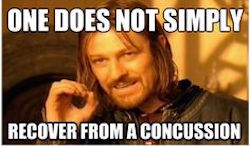 Concussions have become an omnipresent topic in sports media.
Concussions have become an omnipresent topic in sports media.
Professional athletes and sports organizations at large have had to deal with the serious consequences that this headache of an injury has caused.
Along with professional athletes and sports organizations, concussions can directly affect individuals in our community.
Nicola Gray, Certified Athletic Trainer for Sault College and a member of the Concussion Awareness Community Education Committee, has assessed and treated several student athletes in the community for concussions since September.
“It’s really hard to measure how many people in Sault Ste. Marie have experienced a concussion. The symptoms of a concussion are similar to other head injuries, and many people who experience a concussion don’t get treated,” says Gray.
The Concussion Awareness Community Education Committee is a member organization of the Safe Communities Partnership dedicated to educating the public about issues surrounding concussion.
The committee defines a concussion as a type of brain injury that may be caused by a blow to the head, face, neck or body that causes sudden shaking of the brain inside the skull.
Courtney Pinder, Certified Athletic Therapist with Sault College, notes that athletes involved in high impact collision sports including hockey, football, soccer, basketball and martial arts are at highest risk.
Beyond athletes, groups at high risk for experiencing a concussion include:
- Individuals involved in a motor vehicle collision
- Cyclists who are involved in an accident
- Seniors and young children who are prone to falling
“Headaches, nausea, dizziness, vomiting, confusion, memory loss, fatigue, balance problems and mood swings comprise some of the most prominent concussion symptoms,” says Gray.
If you are experiencing any combination of these symptoms at extreme levels over the course of one to two days following a head impact from a sport, vehicle collision, a fall, or any other significant head impact, she suggests seeking attention from a medical professional.
Beyond these short-term symptoms, individuals who experience a concussion often suffer from memory difficulties, sensitivity to light, trouble falling asleep and in some cases, chronic headaches and vertigo.
These effects can drastically reduce a person’s quality of life and have been linked to return to work issues and difficulties with learning in the classroom for students.
So, are there any proactive steps that can be taken to avoid the detriments of a concussion?
Though concussions are never completely preventable, Gray and Pinder recommend the following interventions to reduce the chances of experiencing a concussion:
- Ensure all athletic equipment fits properly, including helmets and mouth guards, based on size and age considerations for impact sports
- Teach and use proper hitting and tackling technique in body contact sports
- Wear a snowboard or skiing helmet when tobogganing
- Wear a helmet whenever you are on the ice, even for casual skating
- Adjust the headrest of your vehicles so that the top of the headrest is level with or above the top of your head and as close to the back of your head as possible to avoid whiplash
- Always wear your seatbelt properly, with the shoulder harness worn across the shoulder and chest as opposed to under the arm or behind the back
- Walk cautiously and be attentive of icy conditions to avoid slipping and falling
For athletes involved in high impact sports, Gray recommends the Concussion Baseline Testing system, a resource available in Sault Ste. Marie through Certified Athletic Trainers, Certified Athletic Therapists, and other medical professionals.
The system, called SCAT3, is a standardized tool for evaluating injured individuals, especially athletes, for concussion.
The system evaluates individuals at a base level before they experience a head injury to obtain measurements on physical and mental assessments.
These base measurements can be compared to those obtained after an injury that causes concussion-like symptoms.
“Qualified SCAT3 assessors can look at the measurements before and after the impact has taken place to determine whether or not a potential concussion has occurred. Once determined, treatments can be then delivered with greater accuracy,” says Gray.
In Sault Ste. Marie, SCAT3 testing is available at Catalyst Fitness, TMX Crossfit, Ignite Gym, Sault College, OTA/PTA clinic, as well as through other medical professionals.
Appointments for SCAT3 testing can be scheduled by contacting representatives of these organizations.
The increased discussion of concussions in sports media has created a misconception that only professional, hard-hitting athletes are at risk.
The Safe Communities Partnership wants to remind everyone that concussions can affect anyone including athletes, drivers, cyclists or pedestrians.
With winter in full swing, there is potential for increased rates of vehicular accidents, slipping on icy surfaces, and head injuries from sports such as hockey, skiing, snowboarding and tobogganing.
Make this winter as safe and fun as possible by taking the steps necessary to avoid experiencing a concussion.
Nicolas Turco – Strategic and Human Resources Coordinator, Sault Ste. Marie Safe Communities Partnership
*************************
Each month the Sault Ste. Marie Safe Communities Partnership offers a safety-related column.
To read more Safety Tips columns, go here.